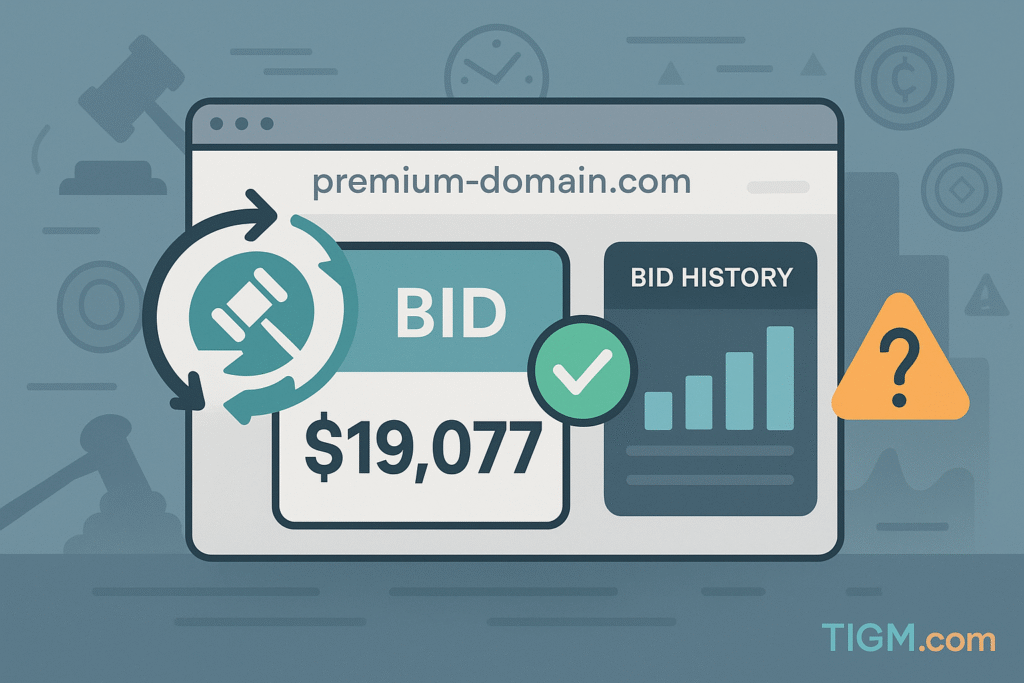Second Auction Completes, But Industry Veteran Threatens Legal Action
The second auction for Coinbook.com closed at $19,077 on November 17, 2025, ending a contentious two-week drama that has Rick Schwartz—the self-proclaimed “Domain King”—threatening legal action against Dynadot over what he calls a systematically flawed auction policy that “rewards abuse and destroys trust.”
The final price represents a massive drop from the first auction’s $33,000 close, but that original sale never completed after the winning bidder defaulted and refused to pay. What should have been a straightforward re-auction has instead become a public battle over marketplace ethics, bidder anonymity, and how platforms handle non-paying winners.
The First Auction Controversy
The original Coinbook.com auction on Dynadot hit $33,000, with Rick Schwartz as an active bidder. When the high bidder defaulted, Dynadot re-auctioned the domain—but here’s where Schwartz’s complaints center: under Dynadot’s policy, the defaulting bidder’s “phantom bids” remained in the auction history, artificially inflating the perceived value and the price legitimate bidders like Schwartz would need to pay to win.
Schwartz claims the last legitimate bid before the defaulter entered was $12,700. That’s the price he argues should have been offered to him as the second-highest legitimate bidder. Instead, Dynadot kept the defaulter’s bids in place, forcing the re-auction to start from an inflated baseline. Meanwhile, Dynadot keeps the defaulter’s forfeited deposit—creating what Schwartz describes as a conflict of interest where “the platform profits whether the fraudster pays or not.”
In a blistering LinkedIn post, Schwartz called out the practice: “Dynadot benefits on both sides and the domain investor gets financially raped. And since bidders are anonymous, there’s no accountability whatsoever. No transparency whatsoever.”
The Re-Auction Results
The second auction closed at $19,077—well below the first auction’s $33,000 but still significantly above the $12,700 Schwartz identifies as the last legitimate pre-default bid. Combined, both auctions only reached $31,700 in legitimate bidding activity, Schwartz notes, despite massive publicity, drama, threads, screenshots, analysis, and the entire domain community watching.
Schwartz isn’t modest about his role in driving the second auction’s price: “And let’s be brutally honest: that $19K only happened because I gave the whole thing oxygen all week long. Without me? It never would have come close to that number.” He points out this came after two weeks, two auctions, dozens of real bidders, and unprecedented attention for an expired domain auction.
The Core Policy Problem
The controversy highlights a fundamental question facing domain auction platforms: how should marketplaces handle non-paying bidders? Different platforms take different approaches. Some re-auction completely from scratch. Others offer the domain to the second-highest bidder but leave the fraudulent winner’s bids in place. A few remove all the defaulter’s bids entirely.
Schwartz argues that leaving phantom bids in the system creates perverse incentives. Bad actors can bid domains up knowing they’ll default, forcing other bidders to pay more while the platform keeps the deposit. There’s no transparency about which bids are legitimate and which came from defaulters. And crucially, bidder anonymity means there’s no public accountability or way to track repeat offenders.
Schwartz’s Three Demands
Schwartz laid out specific actions he wants Dynadot to take:
- Revert sales to the last legitimate bid before defaulting bidders entered
- Remove any financial benefit to defaulters—no platform should profit from deception
- Publicly commit to rewriting the policy so bidders never have to “bid against ghosts again”
He’s framed this as an existential issue for Dynadot’s auction business: “This isn’t a PR hiccup or a minor policy issue, it’s an existential threat to their auction business. When the marketplace loses trust, volume collapses. When transparency dies, bidders disappear.”
The Negotiation That Failed
According to TheDomains.com, Schwartz and Dynadot CEO Todd Han did have discussions about the first auction and what price should have been offered to Schwartz as the second bidder. They did not reach an agreement. The re-auction proceeded, and now Schwartz is publicly threatening to “publish every detail VERY SOON and let the marketplace deliver its verdict” if Dynadot doesn’t fix the policy transparently.
Broader Industry Implications
This isn’t just about one $19,000 domain. It’s about whether auction platforms can maintain bidder trust when policies allow defaulters to manipulate outcomes without consequences. Schwartz has spent three decades in the domain industry and carries significant credibility when he calls out practices he considers unethical.
The anonymous bidding structure that most platforms use for privacy also creates accountability problems. Without transparency about who’s bidding and who’s defaulting, there’s no way for the community to police bad actors. Platforms become the sole arbiters of fairness, and when their policies appear to create financial incentives from defaults, trust erodes.
What Happens Next
Schwartz has made clear he’ll go public with “every detail” if Dynadot doesn’t address the policy. That could include publishing bid logs, correspondence, policy documentation, and a full accounting of how Dynadot handles defaulters across multiple auctions. For a platform trying to compete with established players like NameJet, GoDaddy Auctions, and DropCatch, that kind of transparency-under-pressure could be damaging.
The domain is currently registered through 2026 under Dynadot’s control—meaning they can theoretically re-auction it again if they’re unsatisfied with the $19,077 close. That possibility has some in the community questioning whether registrars should be able to repeatedly auction expired domains “until the winning bid fits their idea of FMV,” as one NamePros poster noted.
The Bottom Line
Coinbook.com sold twice—for $33,000 that was never paid, and then for $19,077 that presumably will close. But the real price of this auction may be Dynadot’s reputation if they don’t address the policy concerns Schwartz has raised. In an industry built on trust and repeat relationships, marketplace policies that appear to profit from defaults while punishing legitimate bidders won’t survive community scrutiny.
Schwartz’s threat to sue isn’t empty bluster—he’s publicly committed to either seeing transparent policy reform or taking legal action. For Dynadot, the next move will determine whether this becomes a footnote or a case study in how platforms lose bidder trust by failing to prioritize transparency over short-term revenue from defaulter deposits.








